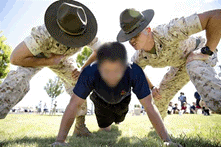Boot camp. Depending on the branch of service you join, it may last anywhere from seven to twelve weeks. Its purpose can be summed up with one word: “Discipline.”
On October 28, 2018, I was reading some posts by both active duty soldiers and Veterans on Rally Point. I just happened to see a picture of two drill instructors disciplining a recruit while they were standing over him. As I studied the image, like a bolt of lightning, I made this connection.
Returning to my own days in boot camp, my mind began processing how we draw from our training and experience and the team mindset learned in squads and platoons to face whatever the current mission throws at us. It is the confidence we gain from the discipline we learn in boot camp that equips us to face gunfire, suicide bombers, landmines, and other dangerous enemy attacks.
The most important job within the ranks of the military is that of the drill instructor, who is responsible for preparing lazy, entitled, youth for the worst scenario imaginable: Being taken alive by the enemy. His captors are not going to put him up in a five-star hotel and see that his every need is met. More likely, he will face starvation, darkness, beatings, solitary confinement, and unimaginable forms of torture in an effort to learn everything he knows about his platoon’s location and objectives. His drill instructor’s tactics will seem like child’s play; yet, they will be the single reason he is physically and mentally prepared to endure this treatment.
Much has been said about post-traumatic stress disorder (PTSD) in recent years as we have become more knowledgeable and understanding of what extreme stress can do to our physical and emotional core. For those suffering from PTSD, the tour of duty has no end. One day PTSD takes such a toll that the discipline learned in boot camp is all that remains to keep the sufferer sane.
The pathology of post-traumatic stress disorder reveals that the effects  of PTSD spill over to the sufferer’s family, friends, coworkers, and caregivers. To effectively address the far-reaching effects of PTSD, pathologists must help the soldier again draw upon the discipline he learned in boot camp. Psychotropic drugs have failed to assist with PTSD.
of PTSD spill over to the sufferer’s family, friends, coworkers, and caregivers. To effectively address the far-reaching effects of PTSD, pathologists must help the soldier again draw upon the discipline he learned in boot camp. Psychotropic drugs have failed to assist with PTSD.
Simple pleasures of everyday life that his family looks forward to can send a PTSD sufferer into deep depression and withdrawal. For example, his children eagerly await the coming fireworks display. What they can’t anticipate is that beautiful display of power and light will send their loved one into a completely delusional state. The first “boom” immediately sends him back to a distant battlefield with guns firing, bombs exploding, and landmines tearing up the ground under his feet. All his senses are experiencing that battle in living color. He can hear the sounds, smell the gunfire, see friends taking fire, and feel himself running. It is so real that he retreats for “cover” from his family and friends.
This behavior is very difficult for family and friends to understand. How can anyone fear fireworks? What’s wrong? What can we do to help? Why can’t you get over it?
PTSD leads to questioning who he is. He sinks deeper into the darkness until he feels like he’s in a bottomless pit. Self-loathing thoughts scream to the soldier: “You are worthless. They deserve so much more. They would be better off without you. Why can’t you just SUCK IT UP!”
The longer a soldier experiences these fears, feelings of hopelessness and distress, and the questioning looks from his loved ones, the deeper he sinks into darkness and despair. At some point, he will start looking for a way out. Suicide becomes a very real option in the mind of a PTSD sufferer.
Eventually, the discipline that once helped may become his worst enemy. With no drill instructor over his back and no mission to pursue, darkness begins to destroy him from within. Decades after discharge, without treatment, he continues to experience the same traumatic episodes over and over again.
What loved ones must understand is, he doesn’t really fear fireworks; he is truly back at war. It’s as real to him right now as it was when he was actually engaged in the battle. There is nothing you can do except get him into a program with other Vets who understand what he’s going through.
If you see these behaviors in your loved one, don’t wait. Call the VA Crisis Hotline at 1-800-273-8255 or Text 838255 NOW!





